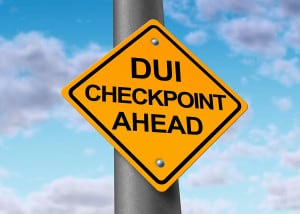
Whether driving by, or reading the latest on Twitter, DUI or sobriety checkpoints are important law enforcement tactics that serve the community by providing assurance that drivers on the road are sober. These checkpoints are typically seen on weekends or after holidays or large public or sporting events, both removing intoxicated drivers from the road and acting as deterrents for people to even consider drinking and driving.
A DUI checkpoint can lead to the arrest of a person who has chosen to drink and drive through several methods. It is important that all drivers understand that under the “implied consent” laws, any licensed driver has already consented to being evaluated for the use of alcohol while driving. In other words, when it comes to a DUI checkpoint, stopping is mandatory for all drivers.
When driving through a sobriety checkpoint, be prepared to show the police officer your driver’s license, registration and proof of insurance. This will eliminate any delays that can occur when driving through a DUI or DWI checkpoint, and make the job of those checking vehicles and drivers easier. If all of the paperwork is in order, and there is no indication that you are operating your vehicle while under the influence of alcohol, you will be given the signal to continue driving. All in all, the process should only take a few minutes, and the benefits are safer streets and communities.
A DUI, DWI or sobriety checkpoint can be one of the best ways to keep drunk drivers off the streets. The effectiveness of these deterrents has been studied and proven to not only reduce the risks involved with people driving drunk, but also are cost-effective when compared to the financial burden a DUI conviction can place on a community. However, if an officer suspects that a person has been drinking and driving, either through visual confirmation, the smell of alcohol or observed behaviors, the driver of the vehicle may be asked to perform a field sobriety test or even take a breathalyzer test. If these tests are refused, the suspected DUI driver can be arrested and charged with driving under the influence of alcohol and undergo further testing once in jail.

Leave a Reply
You must be logged in to post a comment.